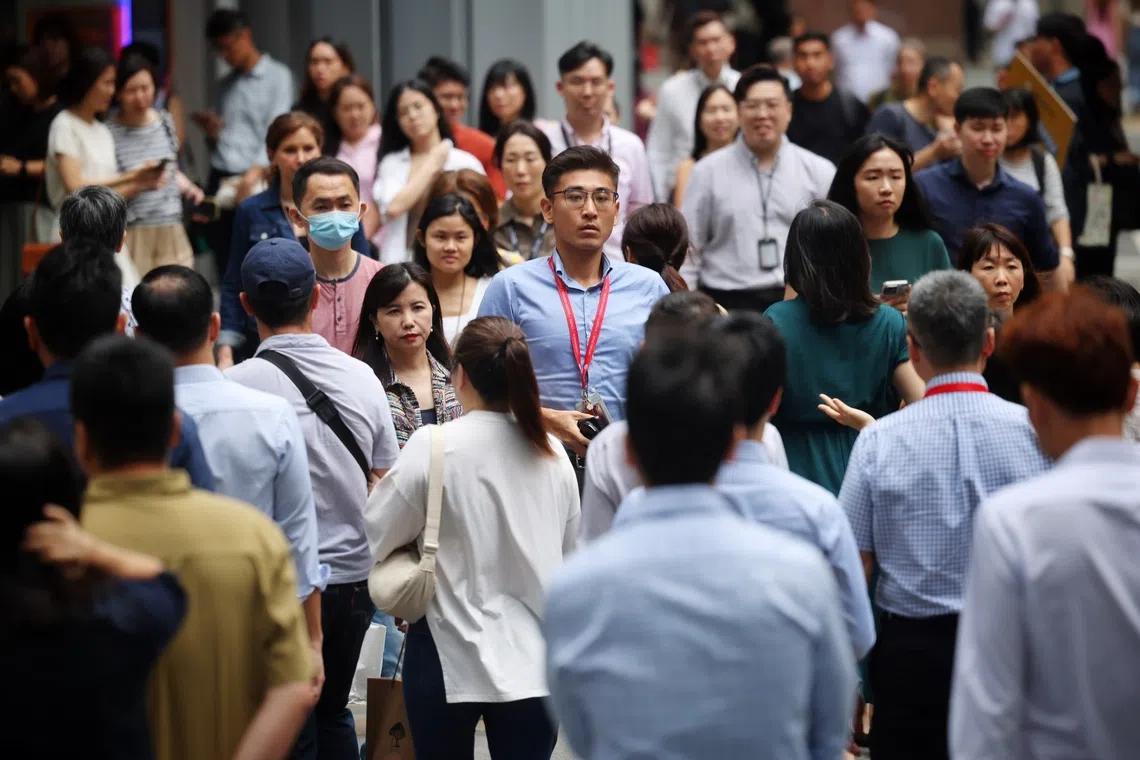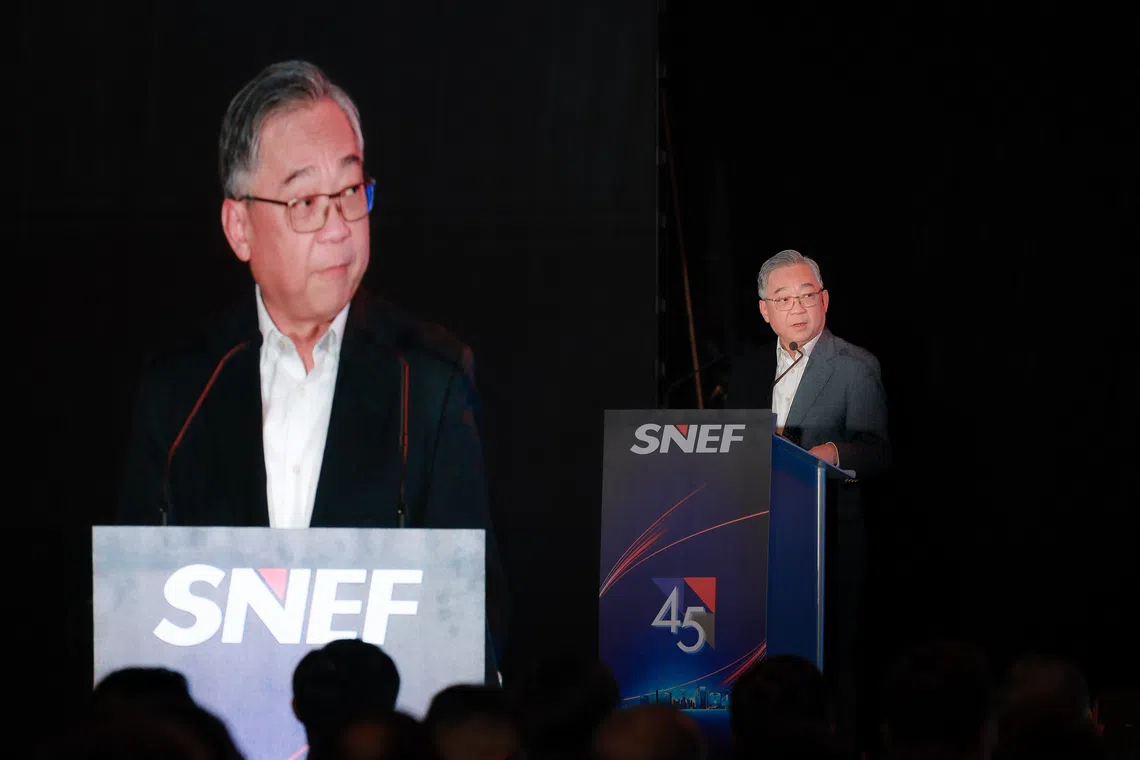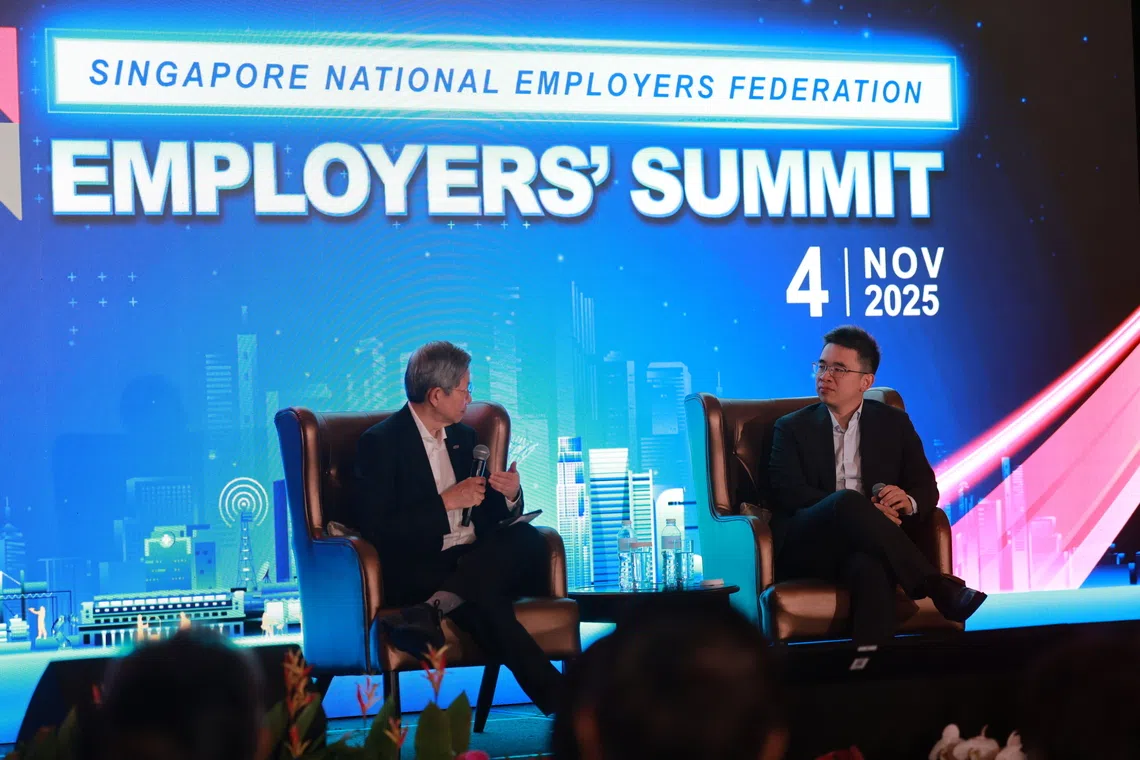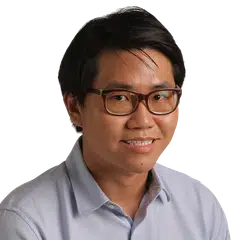Employers’ role in uplifting talent heightened amid uncertainty: Gan Kim Yong
Sign up now: Get ST's newsletters delivered to your inbox

Singapore’s employers union will move more decisively in the ongoing effort to help employers manage disruption and foster workforce agility in four ways.
PHOTO: ST FILE
Follow topic:
SINGAPORE – Employers must play a part to reshape the workforce in line with their changing talent needs, and this effort is core to good business strategy moving forward.
Only then can employers harness opportunities arising from the technological, demographic, and geo-economic shifts besetting the world today, said Deputy Prime Minister Gan Kim Yong on Nov 4.
“To stay competitive and resilient, employers must align business and human capital strategies,” said DPM Gan, who was guest of honour at the 45th anniversary event of the Singapore National Employers Federation (SNEF).
SNEF’s place amid all this change lies in helping employers lead with responsibility, turn uncertainty into opportunity, and build workplaces that are both productive and inclusive, he added.
To do this, Singapore’s employers union will move more decisively in the ongoing effort to help employers manage disruption and foster workforce agility in four ways.
These are: move from foresight to action with sector-specific insights; accelerate job redesign among employers; foster fair and trusted workplaces by preparing employers to implement workplace fairness laws slated for 2027; and uplift the human resource profession.
“Together, these efforts will help employers navigate change with confidence, build trust at the workplace and create opportunities for all,” DPM Gan said.
DPM Gan’s comments on SNEF’s expanded remit echoed those made by SNEF president Tan Hee Teck in an Oct 31 interview with The Straits Times
As part of this push, SNEF unveiled at the event a new Advisory, Resource and Consultancy Centre, a one-stop centre that integrates its advisory, consultancy and business transformation services.
The centre will provide employers with human resources and legal advice, an online portal with case studies and technological tools, and guidance on how to clinch relevant government grants and join schemes that support workforce transformation.
The federation has also set up a research advisory panel to help guide SNEF’s research, to help close what it said was a gap in “systemic, forward-looking research from the employer’s perspective in the national labour market discourse”.
Panel members include Professor Hoon Hian Teck, an international economist at Singapore Management University; Associate Professor Kim Seonghoon, health and labour economist at SMU; and Associate Professor Ravi Chandran from the National University of Singapore, who studies employment law.
NUS distinguished professor Ivan Png, who studies the economics of productivity and innovation, as well as organisational psychologist Trevor Yu of Nanyang Technological University, are also on the panel.
DPM Gan was joined at the event by Dr Tan See Leng, Minister for Manpower and Minister-in-charge of Energy, and Science and Technology; labour chief Ng Chee Meng; NTUC president K. Thanaletchimi; and SNEF president Mr Tan.

Deputy Prime Minister Gan Kim Yong speaking at the Singapore National Employers Federation event on Nov 4.
ST PHOTO: GAVIN FOO
The event, held at the InterContinental Singapore hotel in Bugis, also featured a keynote by Dr He Zhengyu, chief technology officer of Ant Group, on how artificial intelligence (AI) will change society.
Ant Group is the financial technology affiliate of Chinese technology giant Alibaba.
On whether AI would displace workers, Dr He said AI could enable more flexible and inclusive employment too, citing the example of Chinese Paralympics champion Lai Xiaojuan, who works remotely as a customer service representative for the firm.
He also said that while there were earlier waves of excitement around AI in past years, the current wave is not just a fad.
“I think this (time around it) will be real, because this one is not only redefining productivity, but also redefining intelligence itself.”

The event featured a keynote by Dr He Zhengyu (right), chief technology officer of Ant Group, on how artificial intelligence will change society, and was moderated by SNEF president Tan Hee Teck.
ST PHOTO: GAVIN FOO
Dr He said the place of AI in society lies in a master-and-apprentice relationship, with mutual learning between both the technology and its users.
He expressed hope that this dynamic would help round out AI’s capabilities, which have grown much more in knowledge, mathematics, reasoning and science than in “human common sense”.
Afterwards, Dr He fielded questions from among over 300 attendees on how to kick-start AI usage in their organisations, especially small and medium-sized enterprises, and potential pitfalls to keep an eye on, among other topics.
That was followed by a panel discussion with Ms Rowena Yeo, global chief technology officer at Johnson & Johnson; Prof Png of NUS and Mr Ranjiv Ramanathan, senior vice-president of Singapore hub transformation and development at Sats.
Responding to a question by the moderator, Mr Marcus Lam, executive chairman of PwC Singapore and SNEF honorary treasurer, Ms Yeo highlighted the need to develop AI skills among workers concurrently with investing in the technology.
The panellists also touched on the potential for AI to augment roles with a shortage of workers, such as in healthcare, lowering the risk of mass unemployment.
Correction note: In an earlier version of the story, we reported the name of the new SNEF centre as the Advisory, Resource and Consulting Centre. It should be the Advisory, Resource and Consultancy Centre. We are sorry for the error.


